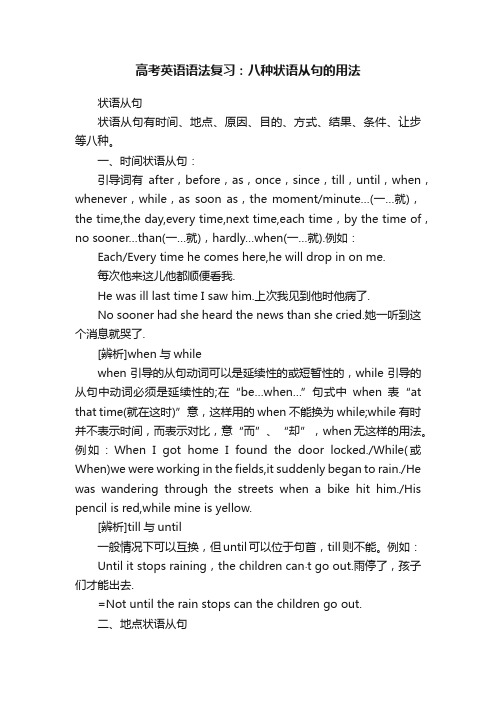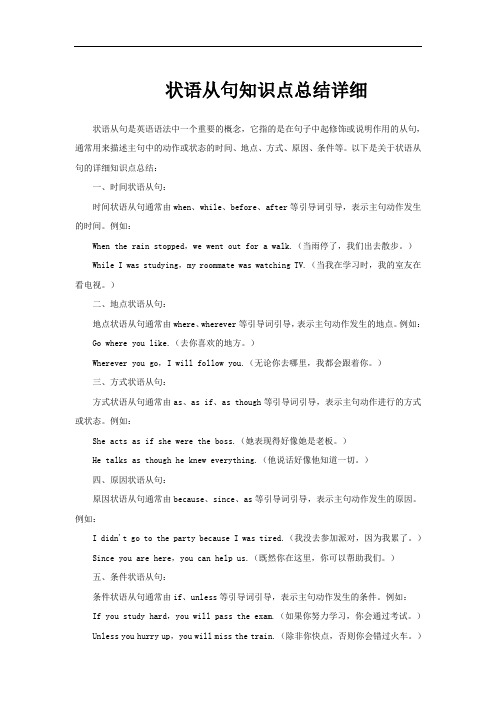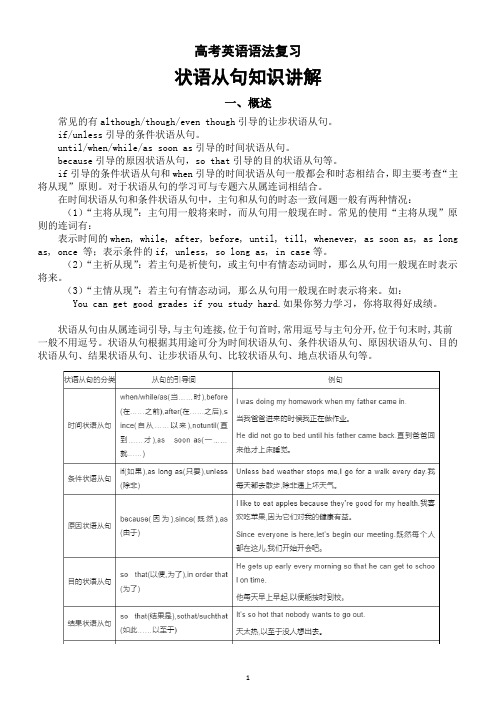时间、地点、条件、让步、原因、结果 状语从句讲解 高考英语语法总复习
- 格式:doc
- 大小:37.50 KB
- 文档页数:6

高三英语总复习之句子系列复习(4)状语从句一、常见状语从句简介概说:由从句担任的状语,在句子中可修饰谓语(或其它动词)、形容词、副词或是整个句子,它可以用来表示时间、地点、原因、目的、结果、条件、方式、比较、让步等。
状语从句是一较大的语法项目,也是近几年高考题中常见的一个重要试点。
高考中已考查了时间、让步、地点、条件、目的等状语从句,这些从句仍是今后高考热点,应作充分准备。
(一)时间状语从句表示时间的状语从句可由when, as, while, whenever, after, before, till (until), since, once, as soon as (或the moment ), by the time, no sooner … than, hardly (scarcely) … when, every time等引导。
e.g. When I came into the office, the teachers were having a meeting.He started as soon as he received the news.Once you see him, you will never forget him.No sooner had I gone to bed than I went to sleep.(二)原因状语从句原因状语从句是表示原因或理由的,引导这类从句的最常用的连词是because, since, as , now that(既然)等,for 表示因果关系时(它引导的不是从句)为并列连词,语气不如because强。
e.g. He is disappointed because he didn't get the position.As it is raining, I will not go out.Now that you mention it, I do remember.(三)地点状语从句引导地点状语从句的连词是where 和wherever等。

高考14种从句用法总复习之状语从句用法状语从句用法状语从句是在复合句中用来修饰动词、形容词或副词的从句。
状语从句共分九种:1.时间状语从句,2.地点状语从句, 3.原因状语从句 4.目的状语从句,5.结果状语从句,6.条件状语从句,7.方式状语从句,8.比较状语从句,9.让步状语从句。
状语从句和其它从句一样都是陈述句语序。
状语从句是历年高考的重点,掌握状语从句的用法对于参加2013年高考的考生至关重要。
第一部分状语从句简明登记表第二部分状语从句的用法一、时间状语从句时间状语从句就是在复合句中,作时间状语的从句。
Every time I fell ill, mother took me to see the doctor. 以前每当我生病的时候,妈妈就带我去看医生。
Each time I go to see Tom, he is always studying at desk. 每当我去看汤姆的时候,他总是伏案学习。
The first time he took part in the competition, he won a second prize. 他第一次参加比赛得了一个二等奖。
【高考连接】【2012全国卷II】⒒ I had hardly got to the office _______ my wife phone me to go back homeat once.A. whenB. thanC. untilD. after 【答案】A【2012安徽】30. When ________ for his views about his teaching job, Philip said he found it very interesting and rewarding.A. askingB. askedC. having askedD. to be asked 【答案】B【2012山东】27. He smiled politely _______ Mary apologized for her drunken friends.A. asB. ifC. unlessD. though 【答案】A【易错提醒】1、主句的谓语动词是将来时、有情态动词或祈使句,以when, before, after, till, until, as soon as, the moment/minute/second, immediately, instantly, directly等引导的时间状语从句中用一般现在时;如果要表达从句的动作已经完成,主句的动作才发生,从句中用现在完成时。


时间/地点/条件/让步/原因/结果状语从句讲解2022届高考英语语法总复习时间状语从句状语是在句子中修饰动词、形容词、副词等的句子成分,用于表达时间、地点、原因、目的、结果、条件、让步、方式、比较的句子成分。
每一种状语从句都有相对应的引导词如:时间引导词: when, whenever, while, since, as, until, once, as soon as等。
He was pretty ambitious when he was young. 在他年轻的时候,他相当有野心。
Whenever I come to this park, it would remind me of my carefree childhood.(每当我来到这个公园,我都会回忆起我无忧无虑的童年。
)While his wife was busy cooking in the kitchen, he was watching TV in the living room.他妻子在厨房忙于做饭的时候,他在客厅看电视。
(既表示动作同时进行,也形成鲜明对比。
)As the day went on, the weather got worse. (随着时间天气变得更糟了。
)since引导的时间状语有一个特殊的点需要指出,先看例句:It is five years since I smoked.应翻译为:我戒烟已经五年了。
(It is +时间段+since 后所接动词是延续性动词表示时间从该动作结束那一刻开始)。
I have smoked for five years.我已经吸烟五年了。
地点状语从句地点状语从句就是一个从句在句子中表示地点、方位的句子。
常见引导词:where, wherever anywhere, everywhere.1,where引导的状语从句Where there is a will, there is a way.有志者,事竟成。

状语从句一、概述:状语从句修饰主句中的动词、形容词、副词等,在复合句中作状语。
引导状语从句的关联词是从属连词。
状语从句用陈述句语序,一般位于复合句的句首或句末。
当从句放在主句前面时,常用逗号与主句隔开。
状语从句根据其在句中的不同作用可以分为时间、地点、原因、目的、结果、条件、让步、方式和比较状语从句九种。
二、用法:(一)时间状语从句的用法:1、注意点:⑴在时间、条件状语从句中,谓语动词一般不用将来时态表示将来,而用一般现在时态代替一般将来时态,用一般过去时态代替过去将来时态,用现在完成时态代替将来完成时态。
如:When he comes here,I will let you know. When I have finished reading the book,I will tell you.注意:when可以引导时间状语从句,还可以引导宾语、主语等名词性从句;if可以引导条件状语从句,也可以引导宾语从句(引导条件状语从句时,意为“如果,假如”,引导宾语从句时,意为“是否”);注意当它们引导时间和条件状语从句时,要用一般现在时态表示将来,引导宾语等名词性从句时,仍然要用一般将来时态表示将来。
如:When he comes here, please tell me. W hen he will come here hasn’t been decided yet.If he has any questions,he will come to ask me. Tell me if you will go to school tomorrow.(2)时间、条件、方式、让步等状语从句常常可以转换成省略形式或简单句句子成分。
①when,while,as,if,though,as if等引导时间、条件、方式、让步等状语从句时,若从句和主句的主语一致或主句的主语是it且含有be动词时,可以将从句中的主语连同后面的be动词一起省略。

高考英语状语从句知识点知识点复习高考英语状语从句知识点复习状语从句是高考英语中的重要语法知识点之一,掌握好状语从句对于理解和运用英语语言有着至关重要的作用。
在这篇文章中,我们将对高考英语中常见的状语从句类型进行详细的复习。
一、时间状语从句时间状语从句表示时间关系,常用的引导词有 when(当时候)、while(在期间)、as(当时,一边一边)、before(在之前)、after (在之后)、since(自从)、until / till(直到)等。
When 引导的时间状语从句,表示一个动作发生时,另一个动作正在进行或刚刚完成。
例如:“I was doing my homework when my mother came back” (当我妈妈回来的时候,我正在做作业。
)While 引导的时间状语从句,强调主句动作和从句动作在同一时期内同时发生,且持续时间较长。
例如:“While I was reading, my sister was playing the piano” (我在读书的时候,我妹妹在弹钢琴。
)As 引导的时间状语从句,强调两个动作同时发生,或一个动作随着另一个动作的变化而变化。
例如:“As time goes by, we are growing older” (随着时间的流逝,我们渐渐变老了。
)Before 和 after 引导的时间状语从句,分别表示“在之前”和“在之后”。
例如:“Please turn off the light before you leave the room” (在你离开房间之前,请关灯。
)“I will call you after I finish my work” (我完成工作之后会给你打电话。
)Since 引导的时间状语从句,表示“自从以来”,主句通常用现在完成时,从句用一般过去时。
例如:“I have lived here since I was born”(自从我出生以来,我就住在这里。

高考英语二轮复习时间、地点、条件状语从句考点总结讲义(基础篇)状语从句状语从句又叫副词从句,用途非常广,却非常简单,简单到中学学习时都没有费太多笔墨,为什么?因为状语从句都有非常明显的代表某种逻辑的标志词,这些标志词总共有九类,也就意味着状语从句分为九种。
分别为:时间、地点、条件、原因、结果、目的、让步、方式、比较。
首先,我们先明确一些理念。
状语从句和并列句的比较1. I am going to leave the party early so that I can get a good night’s sleep.(我要早点离开聚会,那样的话我就能好好睡一觉。
)2. I am going to leave the party early and I want to be able to get a good night’s sleep.(我要早点离开聚会,我要好好睡一觉。
)句1是一个复句,有主句有从句,so that引导的状语从句和前面的主句都是完整、独立的简单句,中间用so that连接;句2是和个合句,逗号前后都是完整的简单句,由一个并列连词and连接,需要注意and两边的句子没有主从之分,相互也不需要解释。
句1这个状语从句由从属连词so that连接,使得so that I can get a good night’s sleep的地位下降,成了前面主句的附属句,当副词使用(目的状语),用来修饰主句“离开聚会早”的目的是“回家好好睡一觉”。
总的来看这两个句子,状语从句的从属连词给句1带来了从属关系,除开这层修饰关系,状语从句和句2的并列句并无二致,同样表意单纯。
状语从句和名词性从句3. The witness said that he saw the whole thing.(证人说他目睹了事情发生的全过程。
)4. The witness said this, though he didn’t really see it.(证人这样说,尽管他没有真正看到。

1.状语从句概念?状语从句指句子用作状语时,起副词作用的句子。
状语从句在高考中考察基本是以翻译从句引导词为主。
2.分类以及各个从属连词用法?2.1时间状语从句(when,while,as, no t…until, since,before……)when,while,as区别:while用引导的动作必须是持续的,侧重于主句动作和从句动作相对比e.g I was cooking at noon while she was sleeping.as“一边…一边…”或着“随着”e.g He was looking behind as he walked.As times flies, the weather is getting cooler and cooler当主句表达短暂性动作,而从句表示一段时间内的延续性动作时,.用三者都可以I met Jim when/while/as I was riding in Heping Road.其他:as soon as, immediately, directly, the moment, the instant, once(一…就…)The boy burst into tears immediately he saw his mom.I will leave here as soon as I get my visa.(主将从现:if/as soon as/when/until 引导的时间状语从句)no sooner…than…; hardly…when…; scarcely…when…(一…就…, 但含有否定意味的词置于句首时,主句要部分倒装)(hardly…before…; scarcely…before…)主句用过去完成时,从句用一般过去时。
I had hardly got home when it began to rain.Hadly had I got home when it began to rain.No sooner had we reached at school than the bell went.till/untill(直到till不可以用于句首), not…until(直到…才…)注意not until强调句用法和倒装句用法。


高考英语语法复习:八种状语从句的用法状语从句状语从句有时间、地点、原因、目的、方式、结果、条件、让步等八种。
一、时间状语从句:引导词有after,before,as,once,since,till,until,when,whenever,while,as soon as,the moment/minute…(一…就),the time,the day,every time,next time,each time,by the time of,no sooner…than(一…就),hardly…when(一…就).例如:Each/Every time he comes here,he will drop in on me.每次他来这儿他都顺便看我.He was ill last time I saw him.上次我见到他时他病了.No sooner had she heard the news than she cried.她一听到这个消息就哭了.[辨析]when与whilewhen引导的从句动词可以是延续性的或短暂性的,while引导的从句中动词必须是延续性的;在“be…when…”句式中when表“at that time(就在这时)”意,这样用的when不能换为while;while有时并不表示时间,而表示对比,意“而”、“却”,when无这样的用法。
例如:When I got home I found the door locked./While(或When)we were working in the fields,it suddenly began to rain./He was wandering through the streets when a bike hit him./His pencil is red,while mine is yellow.[辨析]till与until一般情况下可以互换,但until可以位于句首,till则不能。


状语从句知识点归纳高三高三阶段是学生为了参加高考而奋斗的关键时期。
语法知识对于学生的语言表达和写作能力至关重要。
状语从句是一个常见的语法结构,也是高三学生需要掌握和运用的知识点之一。
本文将对状语从句的定义、分类以及常见的用法进行归纳总结,帮助高三学生更好地应对语法考试和提升语言表达能力。
一、状语从句的定义状语从句是一个句子,在句中充当状语,用来修饰谓语动词、形容词、副词或整个句子。
状语从句通常由连词引导,包括时间、地点、原因、条件、目的、方式等多种类型。
二、状语从句的分类和特点1. 时间状语从句时间状语从句用来表示动作或事件发生的时间,常见的引导词有when、while、as、since、until等。
例如:- She was reading a book when I saw her.- They have been friends since they were in kindergarten.2. 地点状语从句地点状语从句用来表示动作发生的地点或者某个动作的方向,常见的引导词有where、wherever等。
例如:- He will go wherever his parents go.3. 原因状语从句原因状语从句用来表示某个动作或者事件的原因,常见的引导词有because、since、as等。
例如:- He failed the exam because he didn't study hard.4. 条件状语从句条件状语从句用来表示某个动作的发生或者某件事情的成立条件,常见的引导词有if、unless、as long as等。
例如:- If it rains tomorrow, we will stay at home.5. 目的状语从句目的状语从句用来表示某个动作或者事件的目的,常见的引导词有so that、in order that等。
例如:- We study hard so that we can pass the exam.6. 方式状语从句方式状语从句用来表示某个动作或者事件的方式,常见的引导词有as、as if等。

状语从句知识点总结高考状语从句是一个句子,用来修饰主句谓语动词的状语成分。
它使用了连接词(或连接副词),并在主句中充当状语。
状语从句可以表示时间、原因、目的、条件、方式、比较、让步等不同的情况。
1. 引导词状语从句的引导词有很多种,其中最常见的有:(1)时间状语从句:when, while, as, before, after, since, until等。
(2)地点状语从句:where, wherever等。
(3)原因状语从句:because, since, as, for等。
(4)条件状语从句:if, unless, provided that等。
(5)目的状语从句:so that, in order that等。
(6)方式状语从句:as, as if, as though等。
(7)比较状语从句:than, as, as…as等。
(8)让步状语从句:though, although, even if等。
(9)结果状语从句:so…that, such…that等。
2. 位置状语从句一般放在主句前面,但也可以放在主句后面。
当状语从句放在主句前面时,一般用逗号隔开。
例如:Before you leave, please turn off the lights.而当状语从句放在主句后面时,不需要逗号隔开。
例如:He turned off the lights before he left.3. 时态状语从句的时态一般和主句的时态有一定的关系。
在条件状语从句中,通常使用现在时代替将来时,过去时代替过去将来时。
在时间状语从句中,通常使用过去时替代主句中的现在时,过去完成时替代主句中的过去时。
在目的状语从句中,通常使用should/ would/ could/ might+动词原形。
在让步状语从句中,通常使用虚拟语气。
在结果状语从句中,通常使用so…that, such…that引导。
4. 语序状语从句中,如果主句的谓语动词是及物动词,那么连接词的选用也是有一定限制的。

2024年高中英语语法学习之状语从句精讲英语状语从句是英语学习中的一个重要考点,下面将针对英语状语从句进行考点归纳。
一、时间状语从句时间状语从句是语法中的一个重要考点,下面是一些常见的时间状语从句: when:表示某个时间点或时间段,如“I will arrive at the airport when the plane takes off.”before:表示某个时间点或时间段之前,如“I will eat breakfast before I go to work.”after:表示某个时间点或时间段之后,如“I will finish my homework after I have dinner.”while:表示某个时间点或时间段持续,如“I was studying while she was sleeping.”as soon as:表示某个时间点或时间段一过去就发生,如“I will call you as soon as I get home.”until:表示某个时间点或时间段一直持续,如“I won't leave until I have finished my work.”since:表示某个时间点或时间段以来,如“I have been living in this city since I moved here last year.”when/while/as:这些词都可以引导时间状语从句,但它们的使用略有不同,需要根据具体语境选择使用哪个。
需要注意的是,如果主句是一般将来时,从句只能用一般现在时,如“I will go to the store tomorrow”中的“tomorrow”就是时间状语从句。
二、地点状语从句地点状语从句是语法中的一个重要考点,下面是一些常见的地点状语从句: where:表示某个地点,如“I will go to the store where I bought the groceries.”that:表示某个地点或位置,如“I saw a beautiful sunset over that mountain.”which:表示某个地点或位置,如“The building which is on fire needs to be evacuated immediately.”where/that/which:这些词都可以引导地点状语从句,但它们的使用略有不同,需要根据具体语境选择使用哪个。

状语从句知识点总结详细状语从句是英语语法中一个重要的概念,它指的是在句子中起修饰或说明作用的从句,通常用来描述主句中的动作或状态的时间、地点、方式、原因、条件等。
以下是关于状语从句的详细知识点总结:一、时间状语从句:时间状语从句通常由when、while、before、after等引导词引导,表示主句动作发生的时间。
例如:When the rain stopped,we went out for a walk.(当雨停了,我们出去散步。
)While I was studying,my roommate was watching TV.(当我在学习时,我的室友在看电视。
)二、地点状语从句:地点状语从句通常由where、wherever等引导词引导,表示主句动作发生的地点。
例如:Go where you like.(去你喜欢的地方。
)Wherever you go,I will follow you.(无论你去哪里,我都会跟着你。
)三、方式状语从句:方式状语从句通常由as、as if、as though等引导词引导,表示主句动作进行的方式或状态。
例如:She acts as if she were the boss.(她表现得好像她是老板。
)He talks as though he knew everything.(他说话好像他知道一切。
)四、原因状语从句:原因状语从句通常由because、since、as等引导词引导,表示主句动作发生的原因。
例如:I didn't go to the party because I was tired.(我没去参加派对,因为我累了。
)Since you are here,you can help us.(既然你在这里,你可以帮助我们。
)五、条件状语从句:条件状语从句通常由if、unless等引导词引导,表示主句动作发生的条件。
例如:If you study hard,you will pass the exam.(如果你努力学习,你会通过考试。

高考英语语法复习状语从句知识讲解一、概述常见的有although/though/even though引导的让步状语从句。
if/unless引导的条件状语从句。
until/when/while/as soon as引导的时间状语从句。
because引导的原因状语从句,so that引导的目的状语从句等。
if引导的条件状语从句和when引导的时间状语从句一般都会和时态相结合,即主要考查“主将从现”原则。
对于状语从句的学习可与专题六从属连词相结合。
在时间状语从句和条件状语从句中,主句和从句的时态一致问题一般有两种情况:(1)“主将从现”:主句用一般将来时,而从句用一般现在时。
常见的使用“主将从现”原则的连词有:表示时间的when, while, after, before, until, till, whenever, as soon as, as long as, once 等;表示条件的if, unless, so long as, in case等。
(2)“主祈从现”:若主句是祈使句,或主句中有情态动词时,那么从句用一般现在时表示将来。
(3)“主情从现”:若主句有情态动词, 那么从句用一般现在时表示将来。
如:You can get good grades if you study hard.如果你努力学习,你将取得好成绩。
状语从句由从属连词引导,与主句连接,位于句首时,常用逗号与主句分开,位于句末时,其前一般不用逗号。
状语从句根据其用途可分为时间状语从句、条件状语从句、原因状语从句、目的状语从句、结果状语从句、让步状语从句、比较状语从句、地点状语从句等。
二、时间状语从句(1)当主句是一般将来时态或祈使句,表示将来的意义时,从句通常用一般现在时,简称“主将从现”。
I’ll ring you up as soon as I get to Beijing.我一到北京就给你打电话。
(2) when引导的时间状语从句,通常表示主句和从句的动作同时发生;before表示主句的动作发生在从句的动作之前;after则表示主句的动作发生在从句的动作之后;as引导时间状语从句时,往往表示主句和从句的动作同时发生,不分先后。

状语从句副词性从句(状语从句)(一)时间状语从句:用一般现在时表将来1.When(当……时)引导●从句用一般现在时/现在完成时:when + S.+ do/have done……例:I will let you know when you come.●When it comes to +名词/动名词,表示“当涉及(谈)到…..”例:Doing your homework is a sure way to improve your test scores, and this is especially true when it comes to classroom tests.●若从句用一般过去时,主句用过去进行时/be about to(打算)结构,说明主句用来表示从句发生的背景,when就表示为“正在这时”例:I felt somewhat disappointed and was about to leave, when something occurred which attracted my attention.2.While(当……时)引导●从句用一般现在时/现在完成时:while + S.+ do/have done……3.As(正当……时,一边…..一边)引导4.Whenever(无论何时)引导5.Since(自从……以来)引导●主句过去完成时+ 从句一般过去时:S. + did…since S.+ had done●常见用法:It is + time + since……,表示“自从……以来有(一段)时间”例:It is two years since I last met her.6.Every/each time(每当)引导7.Before(在……之前、趁着……还没有、还没来得及)引导●若从句需要用情态动词的,只能用can/could例:Please tell me the truth before I can guess it.●常见用法:It is/was/will be + time +before……,表示“过一段时间(才)会……”例:“It is a long time since I saw you last.”“Yes. And it will be a time before we see each other again.”8.After(在……之后)引导9.Till/until(直到)引导●一般结构:not…(短暂v)...until……,表示“直到……才….”倒装结构:Not until…….,后面倒装强调结构:It is not until……that……例:They did not stop discussing until they came to a conclusion.= It was not until they came to a conclusion that they stopped discussion.= Not until they came to a conclusion, did they stop discussion.10.As soon as(刚……就)引导例:Come here as soon as you finished the work.11.The moment/minute/instant(刚……就)引导例:I recognized her the moment I saw her.12.Hardly/scarcely/(only)just……when(刚……就)引导●从句一般过去时+ 主句过去完成时:S. + had hardly/scarcely/(only)just done…,when S.+ did●若hardly/scarcely/(only)just置于句首,主句须倒装(had+ S.+ done)例:He had hardly left school when it began to rain.=Hardly had he left school when it began to rain.13.No sooner……than(刚……就)引导●从句一般过去时+ 主句过去完成时:S. + had no sooner done…, than S.+ did●若no sooner置于句首,主句须倒装(had+ S.+ done)例:We had no sooner reached the top of hill than we all sat down to rest.=No sooner had we reached the top of hill than we all sat down to rest.(二)地点状语从句1.Where(在……地方)引导:从句用一般现在时例:Where there is smoke, there is fire.2.Wherever(无论在哪里)引导例:Wherever he may be, he will be welcome.(三)条件状语从句:用一般现在时表将来1.If(如果、假如)引导:用虚拟语气●if引导得从句中,若有were, had, should三词,可以省略if,并且倒装(谓语置前)例:If I had known about it, I would have told you.= Had I known about it, I would have told you.●If从句+主句= 祈使句/省略句+ and +…….例:If you give me some food, I won’t die of starvation(饥饿).= Some food and I won’t die of starvation;2.Suppose/supposing(假设)引导例:Suppose we cannot get the necessary equipment(设备), what shall we do? 3.Unless(除非、如果不)引导●Unless从句+主句= 祈使句/省略句+ or +…….例:Unless you give me another drink, I will die of thirst.= Another drink or I will die of thirst.4.As/so long as(只要)引导例:We can surely overcome these difficulties so long as we are closely united.5.If only/only if(只要)引导例:We can surely get gains, if only we work hard.6.In case/lest(万一)例:You should take good care of your kid, in case they are ill.7.Provided/Providing/Given that(假如)引导例:We will let you use the room provided that you keep it clean and tidy.8.On condition that(假如)引导(四)原因状语从句1.Because(因为)引导●表示“直接、唯一的原因”,通常放在句后,可以与not, but, only连用例:He was angry not because we were late but because we made a noise.2.As(因为)引导●表示“显而易见或大家都知道的原因”,语气较弱例:Everyone likes you as you are both kind and honest.3.Since(因为、既然)引导●表示“间接或附带的原因”,通常放在句首例:Since she insists, you must come.4.Now/seeing that(既然)引导例:Now/Seeing that you are all here, let’s try and reach a decision.5.Considering that (考虑到)引导例:Considering that he began learning English only a year ago, he speaks very well. 6.In that(由于、因为)引导例:He was late in that he didn’t catch the first bus.(五)让步状语从句1.Though/although/as(虽然)引导●Though/although…..yet连用,表示“虽然…..但是……”例:Though/although we cannot see air, (yet) it exists everyone.●as引导得从句置于句首,且倒装(表语、状语、动词置于as前)表语倒装:可以省略冠词例:Tried as I was, I stayed up late studying last night.Children as he is, he knows a lot of English.状语倒装:Fast as he read, you can’t finish novel in three days.谓语动词倒装:Try as he would, he couldn’t lift the rock.2.Even if/though(即使)引导例:Nobody lost his patience as though the meeting was long and boring. 3.However/no matter how(无论如何/怎样)引导例:We’ll continue to work, no matter how/however hot it is.4.Whatever/no matter what(无论什么)引导例:Whatever/no matter what r you may do, do your best.5.Whoever/no matter who(无论谁)引导例:Whoever/no matter who all cannot break the rules, we must keep the law. 6.Whether……or/no matter whether…..or….(不管……还是)引导例:Whether/no matter whether you can do or cannot do, you must try it. 7.Whether or not/whether……or not(不管是否……)引导例:Whether or not we had a baby, we couldn’t survive only on my salary.= Whether we had a baby or not, we couldn’t survive only my salary.(六)方式状语从句1.As(如,按照)引导例:When in Roma do as the Romans do.2.Just as(正如)引导例:Most plants need air just as they need water.3.As if/though(好像,仿佛)引导●引导的从句常用虚拟语气,除了叙述的情况实现的可能性较大例:He speaks English as if/though he were an Englishman.例:It looks as if/though the coming autumn harvest will be even better than the last one. (七)目的状语从句1.So that(以便、为了)引导●从句中谓语部分可以用can/could,may/might例:I will give you my phone number, so that you can call me when you arrive here. 2.In order to(以便、为了)引导●从句中谓语部分只能用may/might例:We should do our utmost最大可能in order that we may be able to overfulfil 超额完成the task.3.For fear that/lest(以免、以防)引导●从句用虚拟语气“should +V.”例:Batteries 电池must be kept in dry place for fear that/lest electricity should leak 渗漏away.4.In case(以免、以防)引导●从句中谓语部分不用虚拟语气例:Better take more clothes in case the weather is cold.(八)结果状语从1.that(因而)引导例:What’s the matter that they still haven’t answered our e-mail?2.so that(因而)引导●主句,+ so that,且从句中谓语部分只能用may/might例:The temperature is increased , so that the volume of the gas can become greater. 3.So…..that(如此……以至)引导●so +形容词/副词+a/an+名词+ that例:It is so hot a day that we cannot sleep.●so置于句首时,需倒装状语例:So fast did he run that I could not keep up with him●so + much/little/few/many + that,而不用such…..that例:She has so little education that she is unable to get a job.4.Such…..that(如此……以至)引导●Such +名词(可数的单数名词)+ that例:It is such a lovely day that everybody is feeling happy and gay.(九)比较状语从句1.Than(比……)引导例:There are more vocabularies in this unit than in that one.2.As……as(如……一样)引导●As +形容词/副词+a/an+名词+ as + 省略句例:He is as clever a boy as his brother.例:This book is nearly as thick as that one(is).3.Not so……as(不如……一样)引导●As +形容词/副词+a/an+名词+ as + 省略句例:You are not as tall as she.4.The+比较级,the+比较级(越……越…….)引导例:The hotter that air becomes, the lighter it gets.例题1、()______ your daughter has not come back , let me take you to the Friendship Hospital.A WhenB SinceC ThatD For2、()______ Tom is not feeling well today , he has to stay at home.A ThoughB ForC FindingD As3、()They are ______ hard-working students that they have already made ______ much progress since thay came here.A so ; soB such ; suchC so ; suchD such ; so4、()______ we have finished the book we shall start doing some exercises.A For nowB Since nowC Now thatD Since now5、()He asked us not to be noisy ______ we should wake the baby.A in cseB in the caseC in case ofD in this case巩固练习1、()______ you are familiar with the auther`s ideas , by reading all the sections as quickly as you can.A Ever sinceB As long asC So thatD Now that2、()The boy has to learn ______ things that he hardly has time for play.A so manyB such manyC so fewD such few3、()In the old days the poor worker worked long hours every day ______ he could support his whole family.A becauseB thoughC unlessD so that4、()Tell him that I will call him back , ______ he gives me a call.A in most casesB in caseC in any caseD in case of5、()______ you have reminded me , I will try to be a teacher.A Now thenB So thatC Now thatD In order that6、()You will have to study for many years ______ you may become a brain surgeon.A in order thatB in thatC althoughD soKey 1~5 BDDCA 1~6 DADBCA二、习题1、()It is almost impossible to become skilful in speaking a language ______ you use it constantly.A but forB if onlyC exceptD unless2、()Everything will be all right ______ Tom is left to do the work in his own way.A as far asB mean whileC so long asD in case3、()Do remind me of the date again tomorrow ______ I forget.A in caseB except thatC even ifD as though4、()You must do the experiment ______ the teacher told you.A asB sinceC so thatD unless5、()I could not resist having another piece of cake even ______ I was supposed to lose weight.A althoughB howeverC otherwiseD though6、()______ I suggest , he always disagree.A WhatB HowC WhateverD How a7、()However ______ you hate them , you must work with them.A very muchB too muchC much tooD much8、()Try ______ he might , Tom could not get out of the trouble.A as ifB altoughC ifD as9、()______ whales are very large , they are no longer an even match for man.A SinceB BecauseC Now thatD Although10、()Man must have food just ______ plants must have sunlight.A forB likeC becauseD as巩固练习1、()______ I know , the visitors are all satisfied with the arrangement in the next few days.A As far asB As long asC As well asD As soon as2、()______ convincing an argument is , it needs support of evidence.A No matterB ThoughC HoweverD As3、()Anyone can borrow books from the library ______ he has a library card.A so long asB sinceC even thoughD unless4、()______ much advice I gave him , he did exactly what he wanted to do.A HowB WhateverC WhatD No matter how5、()Remember , science requires your whole life ______ you had two lives to give , they would not be enough.A AlthoughB ThoughC If onlyD Even if6、()I am sure that Laura`s latest play , ______ staged , will prove a great success.A sinceB unlessC onceD until7、()Send us a message , ______ you have any difficulty.A in case thatB in caseC whileD as8、()Electricity flows through a wire ______ water flows through a pipe.A whileB just asC much asD whenever9、()Food shortage will long be a world problem ______ much has been done to supply enough for everyone.A althoughB evenC no matterD since10、()I do not like the city , ______ though I have been living here for more than ten years.A evenB asC everD butkey1~5 DCAAD 6~10 CDDDD 1~5 ACADD 6~10 CBBAA。

高考英语语法专题汇总:状语从句(附练习及答案)状语从句在句中作状语,可分为:时间、条件、让步、原因、目的、结果、地点、比较、方式状语从句。
1时间状语从句引导时间状语从句的连词有:when, as, while, until, not…until, before, after, since, the minute, the moment, each( every, next, the first) time 等。
时间状语从句中一般用一般现在时或一般过去时。
1.when , while, as都可解释为“当```的时候”但侧重点有所不同。
1) When后既可以接短暂性动词,也可以接延续性动词,表示从句动作与主句动作同时发生。
When I arrived home , I had a little rest.2)As 除了表示“当```的时候”,还可表示为“一面```一面”,“随着”He sang as he danced.(一面```一面) You will grow wiser as you grow older.(随着)3)While表示“当```的时候”强调主句的动作和从句的动作同时发生,从句一般用进行时,从句动词必须是延续性动词。
While we were working, they were having a rest.While (they were) having a discussion, they got very confused.注意:while 有对比的含义,解释为“然而”。
eg: I prefer black tee, while he likes coffee.2.until, not…until表示“直到`才”,在肯定句中主句常用延续性动词;在否定句中常用短暂性动词。
肯定句:I waited until midnight. 否定句:I did not leave until midnight. 注意点:1)not until…在句首,主句用倒装 Not until you had explained how did I manage to do it.2) It is not until…that…引导的强调句 It was not until it was dark that he came back.3.Hardly/scarcely…when, no sooner…than, as soon as表示为“一```就```”I had hardly/scarcely got home when it began to rain.I had no sooner got home than it began to rain. It began to rain as soon as I got home.2条件状语从句条件状语从句分为两大类:真实条件句(主将从现)和虚拟条件句(虚拟语气)。
时间/地点/条件/让步/原因/结果状语从句讲解2022届高考英语语法总复习时间状语从句状语是在句子中修饰动词、形容词、副词等的句子成分,用于表达时间、地点、原因、目的、结果、条件、让步、方式、比较的句子成分。
每一种状语从句都有相对应的引导词如:时间引导词: when, whenever, while, since, as, until, once, as soon as等。
He was pretty ambitious when he was young. 在他年轻的时候,他相当有野心。
Whenever I come to this park, it would remind me of my carefree childhood.(每当我来到这个公园,我都会回忆起我无忧无虑的童年。
)While his wife was busy cooking in the kitchen, he was watching TV in the living room.他妻子在厨房忙于做饭的时候,他在客厅看电视。
(既表示动作同时进行,也形成鲜明对比。
)As the day went on, the weather got worse. (随着时间天气变得更糟了。
)since引导的时间状语有一个特殊的点需要指出,先看例句:It is five years since I smoked.应翻译为:我戒烟已经五年了。
(It is +时间段+since 后所接动词是延续性动词表示时间从该动作结束那一刻开始)。
I have smoked for five years.我已经吸烟五年了。
地点状语从句地点状语从句就是一个从句在句子中表示地点、方位的句子。
常见引导词:where, wherever anywhere, everywhere.1,where引导的状语从句Where there is a will, there is a way.有志者,事竟成。
I found my book where I lost it.我在书丢的地方找到了它。
I shall meet him where I first met him.我将在我第一次见他的地方去见他。
2,wherever引导的地点状语从句Wherever you go, I will be right here waiting for you.无论你去哪里,我都在这里等你。
I will go wherever I want .我想去哪儿就去哪儿。
3,anywhere 引导的地点状语从句I will take you anywhere you like.我将会带你去任何你喜欢的地儿。
4,everywhere 引导的地点状语Everywhere they appeared, there were ovations.他们每到一处都收到热烈欢迎。
条件状语从句条件状语从句就是指两个句子是”条件与结果“的关系:事件A导致了事件B。
如果A,那么B,A就是条件,B就是结果。
例如句子:如果没有网络,生活将会很枯燥。
如果所有人都乘坐公共交通的话,道路就会畅通很多。
只要你开心,其他任何事都不重要。
引导条件状语从句的引导词(组)主要有if, unless, so (as) long as, on condition that, so (as) far as, if only ( = if )。
If there were no Internet, life would be very boring.If all commuters take public transportation, the traffic will be much smoother.As long as you are happy, nothing else matters.条件状语从句:表示将来会发生的事,”主将从现“。
表示客观事实或习惯性动作,”主现从现“。
Unless you have a photographic memory, repetition is vital.如果你没有过目不忘的记忆,重复是很重要的。
As long as I come across a bottleneck, I'd like to bum around this place for inspiration.只要我遇到了”瓶颈“,我都会在这里四处随便逛逛,找灵感。
If we run the system for free, there will be less money for the daily expenses.如果我们免费运作这个系统,将会削减人们的日常开销。
让步状语从句“让步”就是退一步来讲,仍然成立。
比如我非常爱打篮球,一般风和日丽的放学午后约三五好友去操场打球是很爽的。
但对于我来说,即使天气条件糟糕的很,是阴天,是雪天,我也一如既往去打球(即使最差条件也接受)。
或者一般好看的都有对象,但对于某些人,虽然他帅气多金,依然是黄金单身汉。
有担当的人会说无论出什么事情,我们愿意承担全部责任。
这些由“即使”,“虽然”,“无论”所引导的句子都是在做出“让步”。
引导让步状语从句的连接词有:although, though, even if, even though, as, 疑问词+ ever ,no matter + 疑问词. as引导让步状语从句要半倒装。
Even if my body coordination is poor, I am fascinated with dancing.即使我身体协调性差,我还是喜欢跳舞。
Much as he disagreed with the idea, he was willing to go along with the majority.尽管他很不同意这个观点,但是他还是愿意随大流。
Child as he is, he knows a lot.虽然他是个孩子,但他懂得很多。
Although (though) he was over sixty,(yet) he began to learn French .虽然他60多岁了,但仍开始学习法语。
No matter who takes up the matter for me, I shall be very grateful.不管谁为我出来这件事,我都将非常感激。
原因状语从句常见的原因状语引导词:because, as, since, for, now that, seeing that等。
because从句所表示的是对方不知道的直接的原因,因此在回答why引导的特殊疑问句时只可用because, 语气最强。
eg.Why were you late for class today?(今天为什么迟到了?)--Because my alarm clock didn't go off this morning.(因为今早我的闹钟没响)I am really into watching American sitcom mainly because it is beneficial for boosting my English level. 我喜欢看美剧最主要的原因就是它可以提高我的英文口语水平。
语气最强,所以常用于强调句。
It is because he is witty that we all like him.正是因为他非常诙谐幽默所以我们都很喜欢他。
2. since 表示既然或者全已知的理由,稍加分析即可表明的原因,多放于句首。
语气较之弱一点。
Since everyone is ready, let's begin it.既然每个人都准备好了,我们开始吧。
Since I used to be a nerdy man, I' d like to have a healthier life by doing some sports.因为过去过着一种书呆子生活,所以想通过做运动过得更健康些。
3. as 引导的原因状语从句,as从句常放在句首,说明原因,主句说明结果,常用于口语中。
As it's raining outside, you'd better take a taxi.既然外边下雨了,你最好打个车。
It is a very popular tourist destination, especially for families,as it brings history for the children.它是一个非常受欢迎的旅游目的地,尤其是对家庭来说,因为它为孩子们展示了栩栩如生的历史4. for往往用于附加理由证明,对前面一句进行解释,有时表示其理由具有推测性。
一般放句尾。
We listened carefully, for the speech was very important.我们认真听讲因为这个演讲很重要。
The day gets long, for it is summer now.白天变长因为现在是夏天了。
5. seeing (that), now that 和since, as 意义相似,他们都有“鉴于某个事实”的意思,that可以省去Seeing that I live further uptown than you, I could, theoretically, pick you up.鉴于我住得比你远,理论上,我可以捎带你一程。
Now that he understood, he anger faded away.既然她明白了,她的怒气就消了。
结果状语从句结果状语从句是相对较为简单的一类状语从句。
常用连词so that, so...that; such...that 引导的句子。
常译为:如此……以至于。
1. so that 前一般有逗号,表示其引导的是结果状语从句而非目的状语从句。
We turned up the radio, so that everyone heard the news.我们调高了收音机音量,结果每个人都听到了。
He spoke at the top of his voice, so that the students at the back heard him.他说话声音很大,结果后面的同学都听到了。
The room was packed with people, so that we couldn't get in.房间里挤满了人,结果我们进不去。
2. so +adj/adv+that... 也就是说so 后边只能跟形容词和副词。